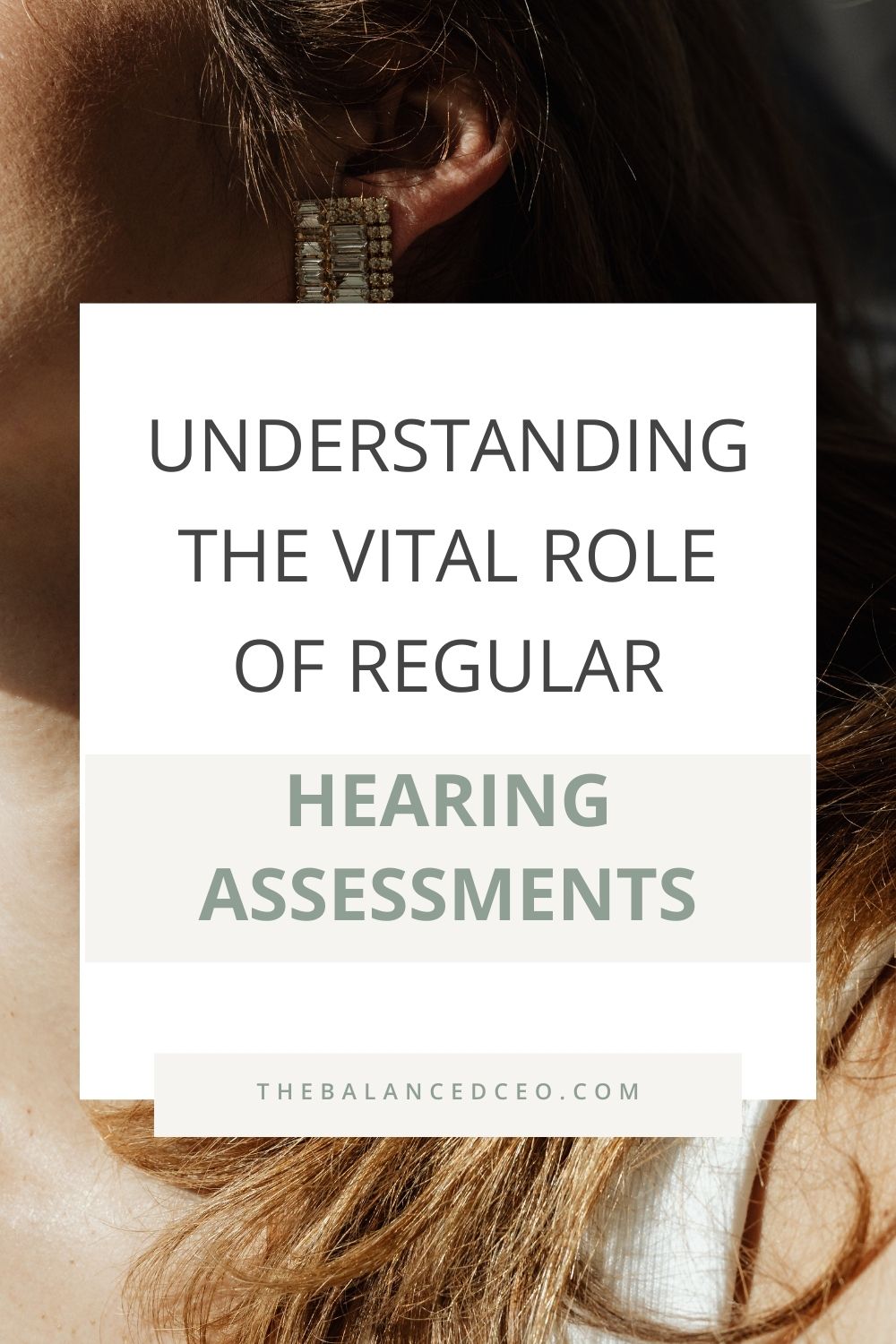This post may contain affiliate links, which means I’ll receive a commission if you purchase through my links, at no extra cost to you. Please read full disclosure for more information.

Regular hearing assessments are foundational for sustained auditory health. Subtle and progressive, hearing loss can be elusive, escaping early detection. It is recommended for individuals over 60—particularly those with a history of noise exposure or existing auditory impairment— to have annual hearing checkups. For younger adults, an assessment every three to five years is prudent.
Should any signs of hearing challenges surface in children, prompt testing is imperative. Often, what appears as inattentiveness could signify a hearing difficulty, the resolution of which is vital for the child’s speech and language development.
The importance of having your hearing tested regularly cannot be overstated. Not only does it allow for early detection of any potential hearing loss, but it also helps in monitoring and tracking any changes in your auditory health over time. This is especially crucial for those who work in noisy environments or regularly engage in activities that can damage their hearing.
Benefits of Regular Hearing Tests at Your Local Hearing Clinic
Regular hearing tests at your local hearing clinic are not only convenient but essential for maintaining optimal hearing health. Such clinical assessments help in early detection and management of hearing loss, enable customised hearing protection strategies for those exposed to noisy environments, and assist healthcare professionals to prescribe and adjust hearing aids accurately for those who need them.
Additionally, consistent hearing check-ups can uncover any underlying health issues that may contribute to hearing deterioration, allowing for a more comprehensive approach to your auditory wellness.
Combating Cognitive Decline Through Early Intervention
Routine hearing evaluations are not just about preserving our ability to hear, but they also serve as a proactive measure against cognitive deterioration. Early identification and management of hearing issues may help safeguard the brain’s audio processing functions, thus potentially staving off related cognitive declines. If you’re looking for support options, consider looking for Unitron hearing aids as part of your early intervention plan.
Ensuring holistic health
Hearing assessments go beyond evaluating auditory health, potentially revealing other medical conditions. Addressing correlating health problems, such as hypertension that may manifest as tinnitus, can be integral to a comprehensive wellness strategy, often alleviating concurrent hearing anomalies.
Proactive Measures to Sustain Auditory Function
Timely detection and intervention are pivotal in averting further hearing impairment. Audiologists play a crucial role in early diagnosis, enabling straightforward treatments to prevent both temporary and irreversible damage to one’s hearing capacity.
Tracking Auditory Health Over Time
Gradual changes in hearing ability can go unnoticed. Regular check-ups provide audiologists with the opportunity to monitor your hearing thresholds, ensuring subtle shifts don’t accumulate into significant hearing challenges.
Tailoring Hearing to Life’s Evolving Soundtrack
As life’s scenarios transform – from career transitions to shifting pastimes – your auditory needs may also require an adjustment. Regular check-ins with an audiologist enable fine-tuning of hearing aids or other devices, ensuring optimal performance in every new chapter of life.
Addressing the Emotional Aspects of Hearing Loss
Beyond the mechanics of hearing, regular tests are a compassionate response to the psychological toll of hearing impairment. These preventive visits can alleviate the emotional burden such as social withdrawal and lowered self-esteem, fostering well-being through maintained connectivity with the world around us.
Understanding Audiometry: The Science of Hearing Tests
Audiometry, the cornerstone of hearing assessments, employs an instrument known as an audiometer to generate sounds at various volumes and pitches and map your auditory sensitivity in an audiogram—essentially a detailed chart of your hearing ability. During the process, you’ll be equipped with specialised headphones and a bone conduction device, which transmits sounds directly to the inner ear.
The audiologist will ask you to signal as you discern each tone, starting from louder volumes and descending to barely audible frequencies, including both lower pitches akin to a distant thunder and higher ones reminiscent of birdsong or children’s voices. This nuanced testing of each ear enables the audiologist to characterise your hearing profile accurately and individualise any necessary treatments, such as fitting hearing aids to enhance your auditory experience.
Furthermore, by varying the sound delivery through headphones and bone conduction, the audiologist can discern the nature of hearing loss, whether it be Conductive, Sensorineural, or a mix, informing a more tailored therapeutic approach.
Comprehensive Advantages of Routine Hearing Evaluations
Routine hearing evaluations are crucial in managing confirmed hearing loss effectively. By consistently monitoring your auditory capacity, an audiologist can stay ahead of any progression or changes in your condition. These regular assessments aid in pinpointing contributing factors to hearing loss, allowing for a personalised approach to your care.
Here are the key benefits of maintaining regular hearing assessments:
Enhancing Auditory Stimulation with Hearing Aids
In cases of auditory degeneration, hearing aids are integral in delivering crucial stimulation to a weakening auditory system, providing fresh sensory input to the brain. Your audiologist meticulously tests your hearing to ensure that the amplification from the hearing aids aligns with your specific auditory profile. Should your hearing nuances shift over time, audiologists have the capability to reprogram the devices, adapting them to your current hearing needs.
Tinnitus Management Through Expert Care
For those experiencing tinnitus—a constant internal noise that can disrupt focus and sleep—comprehensive audiologic evaluations are critical. Audiologists conduct thorough examinations and utilise your health history and lifestyle information to target the underlying causes of tinnitus, allowing them to recommend strategies for management and relief.
Balancing Act: Diagnosing and Managing Vestibular Disorders
Early detection of balance disorders, often related to the inner ear, such as Meniere’s Disease or Positional Vertigo, is possible through meticulous hearing tests. A timely diagnosis can fast-track the initiation of appropriate treatments, improving outcomes and quality of life.
Preemptive Hearing Health Screenings
Regular hearing screenings are proactive measures, designed to catch the onset of auditory issues before they escalate into significant challenges. Early identification usually translates to more effective treatment, especially when compared to addressing severe, long-term hearing loss.
The Broader Spectrum of Hearing Health
Beyond hearing itself, consistent screenings can act as harbingers for a variety of health concerns, including heart disease, cognitive impairments, and chronic conditions like diabetes and hypertension. Such preemptive care enables earlier intervention and holistic management of one’s overall well-being.





Leave a Reply